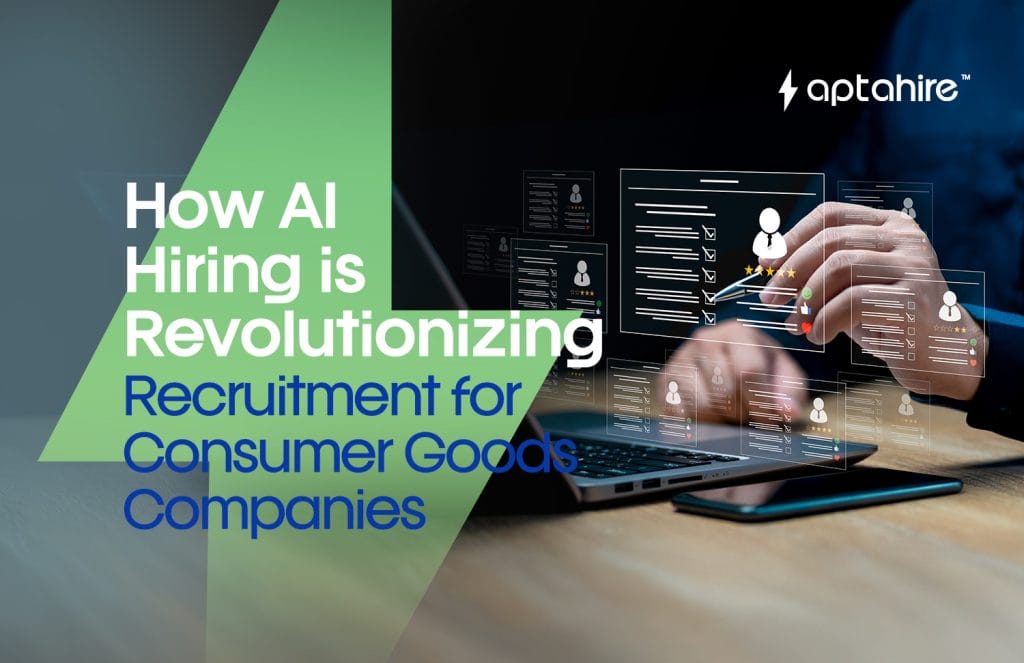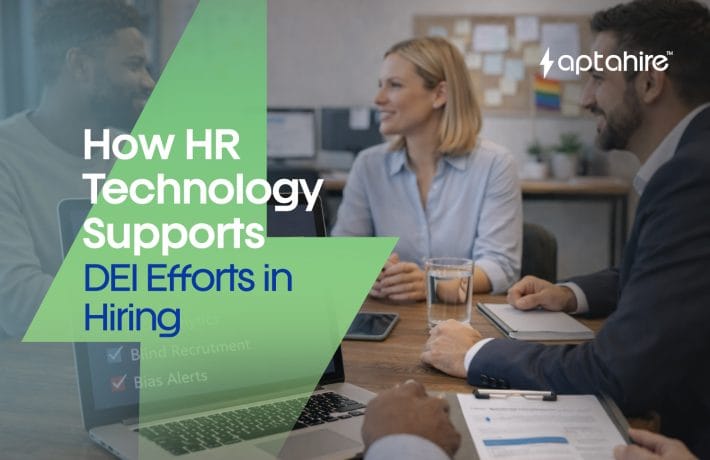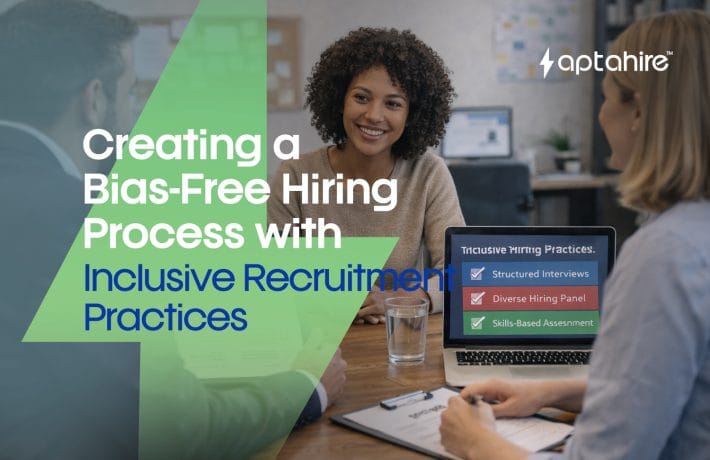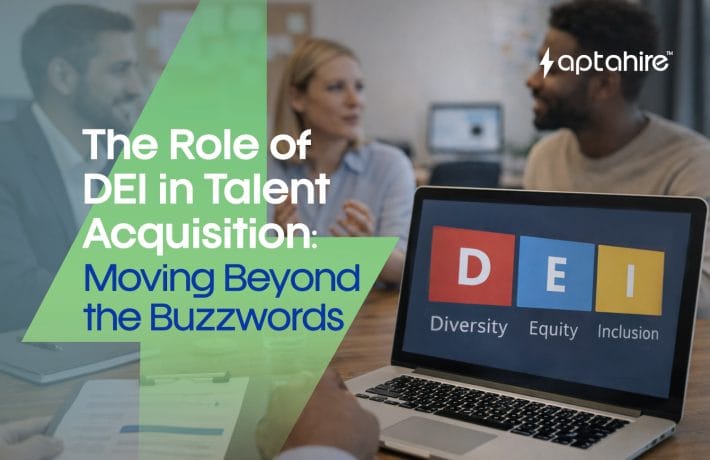How AI Hiring is Revolutionizing Recruitment for Consumer Goods Companies

Introduction
The consumer goods industry is fast-paced, competitive, and constantly evolving. New product launches, seasonal demand spikes, and shifting consumer trends mean that companies often need to hire quickly, and in large numbers, without compromising on quality. Traditionally, this has been a massive challenge. Recruiters would have to sift through hundreds (sometimes thousands) of applications, juggle back-and-forth interview scheduling, and ensure the right cultural fit, all while racing against the clock.
Now imagine a world where technology acts as your recruitment co-pilot, helping you find, evaluate, and engage top talent in a fraction of the time it once took. That’s exactly what Artificial Intelligence (AI) is bringing to the table.
AI hiring is no longer a futuristic concept. Leading consumer goods brands, from multinational FMCG giants to fast-growing startups, are already integrating AI-driven tools to source better candidates, speed up decision-making, and improve the overall hiring experience for both recruiters and job seekers. And this isn’t just about automation, it’s about making recruitment smarter, more inclusive, and more human-centered by freeing up recruiters from repetitive tasks so they can focus on building genuine connections with potential hires.
In this blog, we’ll explore exactly how AI hiring is transforming recruitment in the consumer goods sector, share real-world examples, and break down practical tips for adopting it in your own hiring strategy, while keeping ethics, fairness, and trust at the core.
1. Smarter Sourcing & Screening with AI
AI tools powered by machine learning and natural language processing (NLP) are transforming how candidates are found and evaluated:
- AI scans resumes and profiles quickly, matching keywords, skills, experience, and cultural fit.
- Some advanced platforms analyze psychometric data and patterns across hundreds of factors, building what’s been called a “professional genome”, not just a résumé.
- This leads to faster identification of qualified candidates, reducing reliance on human gut feel and boosting fairness.
Bottom line: more precision and less bias during initial screening stages.
2. Supercharging Candidate Engagement
Consumer goods companies often face high-volume hiring surges; seasonal spikes, new product launches, or retail rollouts. AI-powered chatbots and virtual assistants help manage this:
- Chatbots answer applicant queries, guide them through the process, gather needed info, and even schedule interviews, automating what would take weeks manually.
- Chipotle’s “Ava Cado”, powered by Paradox.ai, slashed candidate time-to-hire from ~12 days to ~4 days, doubled application completion rates from 50% to over 85%, and helped fill 20,000 seasonal roles during “burrito season”.
That speed doesn’t just impress employers, it makes candidates feel seen, responded to, and respected.
3. Elevated Candidate Experience and Personalization
AI lets companies personalize communication and streamline workflows at scale:
- AI‑driven tools can tailor messaging based on candidate preferences, job fit, and behavioral data.
- Generative AI copilots can help recruiters craft inclusive job descriptions, automate follow-ups, and optimize outreach timing tailored by role and profile.
This not only enhances candidate perception but also boosts recruiter productivity.
4. Data-Driven Metrics & Strategic Decision-Making
Once AI is integrated, it becomes a goldmine of insights, not just resumes:
- AI platforms generate dashboards on time‑to‑hire, conversion rates, skill gaps, and predictive trends.
- Consumer goods employers benefit by understanding future hiring needs, based on product launches, promotions, and emerging skills (e.g. digital marketing, supply‑chain analytics).
This creates strategic foresight, not just reactive hiring.
5. Risks & Ethical Imperatives: Fairness First
AI isn’t magic; in recruitment it must be managed with transparency and fairness:
- Studies show AI can inherit and amplify bias, whether in candidate ranking or chatbot responses. Fairness metrics, audits, and mitigation methods are essential.
- Retail and consumer goods firms must safeguard data privacy, transparent decision logic, explainable outcomes, and comply with local regulations (e.g. AI interview laws like Illinois’ Video Interview Act).
Organizations like IBM emphasize building traceable, behavioral‑science backed AI solutions that rank well with global analysts.
Real-World Success: Lessons from the Industry
- Unilever reportedly reviewed over 250,000 applications using AI, cutting hiring from months to weeks, saving tens of thousands of labor hours, and improving consistency across global functions Wikipedia.
- Torre.ai, a startup aimed at full automation, claims to make recruiting 3× faster, ~50% cheaper, while bypassing resumes and matching across hundreds of data points.
These results show AI is more than promising, it’s already transforming talent acquisition in real time.
Practical Tips for Consumer Goods Recruiters
| Step | What to Do | Why It Matters |
| 1 | Map out hiring challenges (e.g. seasonal surge, specialized roles) | Tailored AI tools work better than one-size-fits-all |
| 2 | Choose AI platforms that offer auditability, inclusion, privacy | Reflects EEAT, trust and fairness matter |
| 3 | Pilot with live roles and track results (completion rate, quality, bias metrics) | Validate before scale-up |
| 4 | Blend human touch, smile agents + recruiter calls, to balance automation | Keeps empathy and employer brand alive |
| 5 | Monitor continuously, update models, review feedback, adjust strategy | AI evolves; so should your process |
Real Impact for Consumer Goods: Why It Works
- Speed at scale: Seasonal hiring or rapid store openings in retail FMCG? AI helps hit targets fast.
- Better candidate quality: Smarter matching = stronger talent, especially for technical or omnichannel roles.
- Stronger employer brand: When candidate experience is smooth, responsive, and respectful, it reflects well.
- Strategic insights: Predictive hiring data helps plan ahead, say for sustainability experts or digital transformation specialists.
Final Thoughts
The future of recruitment in consumer goods is here, and it’s powered by AI. From screening thousands of applications in minutes to providing personalized candidate experiences at scale, AI is transforming the hiring process into something faster, smarter, and more accurate than ever before. But perhaps the biggest win is not in replacing human recruiters, it’s in empowering them.
By taking over time-consuming, repetitive tasks, AI frees recruiters to focus on what they do best: understanding people, building relationships, and aligning the right talent with the right opportunities. In a sector where brand image, speed-to-market, and customer satisfaction are everything, having the right team in place, quickly, can make all the difference.
However, with great power comes great responsibility. AI must be implemented ethically, with transparency, fairness, and a commitment to continuous improvement. That means monitoring for bias, safeguarding candidate data, and ensuring that the technology complements, not overshadows, the human touch in hiring.
For consumer goods companies willing to embrace AI thoughtfully, the benefits are undeniable: reduced hiring times, better-quality candidates, improved retention, and a stronger employer brand. The companies that act now will be better prepared not just for their next hiring cycle, but for the future of work itself.
In short, AI hiring is not just a trend, it’s a strategic advantage. And in an industry that moves as quickly as consumer goods, that advantage might be exactly what helps you stay ahead of the competition.
FAQs
1. What is AI hiring in the context of consumer goods companies?
AI hiring refers to the use of artificial intelligence tools, such as machine learning, natural language processing, and predictive analytics, to automate and improve different stages of the recruitment process. For consumer goods companies, this means faster resume screening, smarter candidate matching, automated interview scheduling, and enhanced data-driven hiring decisions.
2. How does AI hiring benefit consumer goods companies specifically?
In consumer goods, hiring often happens at scale due to seasonal demand, store openings, or product launches. AI helps by shortening time-to-hire, improving candidate quality, and ensuring consistent screening across large volumes of applicants, while also boosting the candidate experience with faster responses and clear communication.
3. Will AI hiring replace human recruiters?
No. AI hiring is designed to support, not replace, human recruiters. It automates repetitive tasks like resume screening and interview scheduling, freeing recruiters to focus on relationship-building, strategic decision-making, and cultural fit assessments.
4. Can AI hiring reduce bias in recruitment?
Yes, if implemented correctly. AI can be programmed to ignore demographic information like age, gender, and ethnicity, focusing instead on skills and qualifications. However, if the data fed into AI systems contains bias, it can unintentionally replicate it, which is why bias monitoring and regular audits are essential.
5. How does AI improve the candidate experience?
AI-powered chatbots and personalized email systems can respond to candidates instantly, guide them through the application process, and provide timely updates. This makes candidates feel valued and engaged, improving their perception of the company and increasing offer acceptance rates.
6. Is AI hiring cost-effective for consumer goods companies?
Yes. While there’s an initial investment in AI tools, companies save significantly over time through faster hiring, reduced turnover, lower reliance on third-party recruiters, and better-quality hires who stay longer in the role.
7. What types of AI tools are used in recruitment for consumer goods?
Common AI tools include:
- Resume parsing software (e.g., HireVue, Paradox)
- Candidate matching algorithms (e.g., Torre.ai)
- Interview chatbots (e.g., Olivia by Paradox.ai)
- Predictive analytics platforms for workforce planning
- Video interview analysis tools for assessing skills and communication style
8. How quickly can AI reduce hiring timelines?
Case studies in the consumer goods sector show that AI can reduce time-to-hire by 50% or more. For example, Chipotle’s AI chatbot “Ava Cado” reduced hiring timelines from 12 days to 4 days for thousands of seasonal hires.
9. What are the risks of using AI in recruitment?
The main risks include potential algorithmic bias, over-reliance on automated decisions, and concerns over data privacy. These can be managed by choosing ethical AI vendors, ensuring human oversight, and complying with legal requirements such as GDPR or local AI hiring laws.
10. How can a consumer goods company get started with AI hiring?
Start small by identifying the biggest recruitment pain point, such as screening or scheduling, and implement an AI solution for that. Measure its impact, train recruiters to work alongside the tool, and gradually expand AI integration to other parts of the hiring process.



